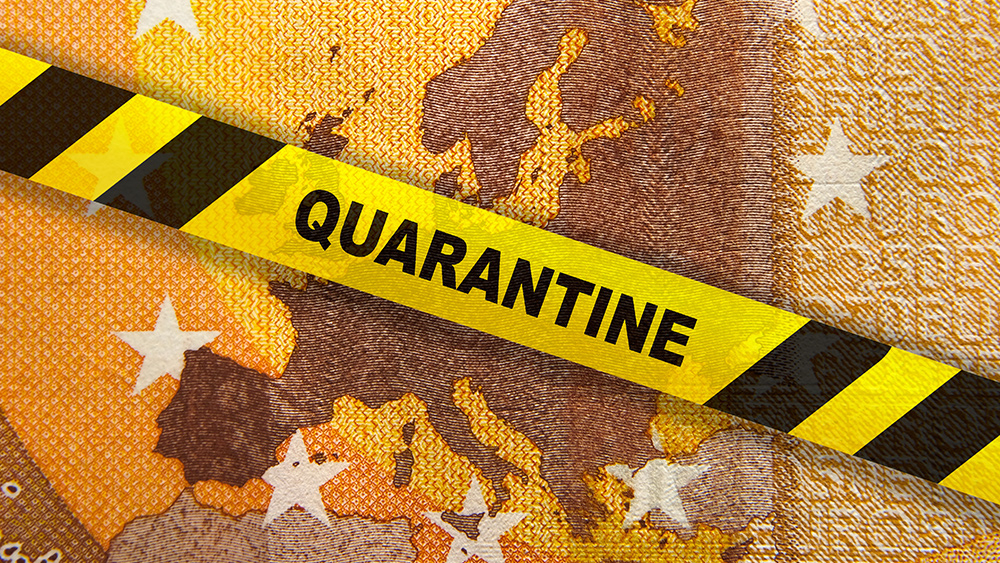Protests erupt all over Europe as governments reimpose coronavirus lockdowns
11/05/2020 / By Arsenio Toledo

European workers and businessmen are taking to the streets to protest the reimposition of Wuhan coronavirus (COVID-19) lockdown by their governments in the face of the second wave of coronavirus infections in the region. While the specifics of the lockdowns vary per nation, all reintroduced lockdowns feature tough curbs on the freedoms of movement and assembly.
From Italy to Ireland, small business owners as well as workers who affected by the lockdowns are mounting protests to fight against their return. Governments, for their part, are finding it harder to enforce new restrictions since even local government officials are now questioning the need for another lockdown. (Related: France, Germany impose fresh lockdowns in the face of resurgent coronavirus cases.)
Many businesses in Europe reluctantly agreed to abide by lengthy lockdowns earlier this year when the first cases of the coronavirus started spreading like wildfire through Europe. However, these same business owners and workers have now come around to understanding that perhaps another heavy lockdown is not the right way to combat the spread of COVID-19 through their community.
Protests erupting all over Europe against lockdowns, some have turned violent
In France, many small business owners – sometimes backed by their mayors and other municipal officials – are complaining about the supposed injustice being done to them by President Emmanuel Macron’s government. They argue that the restrictions being imposed are detrimental to small businesses while advantageous for big chain stores and online retailers like Amazon.

To appease these small business owners, French Minister for Finance Bruno Le Maire said that supermarkets and online retailers will be treated similarly to small shops.
However, this has not deterred the protests, which have already erupted in France despite the new lockdown coming with generous economic safety nets. In cities like Paris, Toulouse and Castres, small protests with around 100 people each have already popped up. In Castres, local shopkeepers protesting held up a banner that read “Upright today, on our knees tomorrow.”
“What we want is not just aid money,” said Francis Palombi, president of the Confederation of French Traders. “We want above all to open, open, open!”
In Italy, parliament approved the renewed lockdown restrictions, which will force cinemas, theaters and gyms to close and bars and restaurants to shut down after 6 p.m. The government has also looked at introducing a national 9 p.m. curfew, banning travel between regions and shuttering shopping malls during the weekends.
This has led to a wave of protests all over the country, including in some of Italy’s largest cities. In Turin, taxi drivers occupied the city’s central square. In Cremona, restaurant owners conducted a noise barrage by beating their pots and pans.
Business owners have raised banners and chanted slogans such as “Work is our right” and “If you close us down, you pay up.” One businessman in Milan told Agence France-Presse that government benefits don’t always arrive, and if they do it’s never enough to keep his business afloat. He’s also concerned by the fact that no support is going to the large number of Italians working in the informal economy.
The protests have turned violent in the cities of Rome, Naples, Bologna and Turin. Here riot police fired tear gas into crowds while demonstrators threw bottles, rocks and Molotov cocktails at police lines.
In Spain, the center-left government reintroduced a night-time curfew and locked down the borders between its 17 regions. This has also led to anti-lockdown protests, some of which turned violent with instances of light property damage, such as vandalism, occurring in several cities.
At least 32 people were arrested and 12 more protesters injured in Madrid after police broke up a demonstration against the city’s curfew.
Protests also erupted in Belgium and Germany. In Belgium, police had to break up an unauthorized protest in Brussels. In Berlin, a crowd of 2,000 activists held a rally against all coronavirus-mandated restrictions.
“We are here and we are loud because we are being robbed of our freedom,” said the German protesters.
Lockdowns not recommended, but inevitable
In response to German Chancellor Angela Merkel’s announcement that she will be reimposing new lockdown measures in Germany, the National Association of Statutory Health Insurance Physicians (NASHIP), which represents over 175,000 physicians and psychometricians in Germany, released a strategy paper arguing against the lockdown.
In their paper, they argued that Germany’s current coronavirus restrictions are enough to keep the country’s outbreak from getting worse. They also argue that it will be more economically sound to maintain the current restrictions, rather than spending billions of Euros during a lockdown to keep businesses afloat.
NASHIP also believes that more federal funds should be spent on communicating to the German public the importance of following and strictly enforcing current regulations. This will improve compliance, and might even help people learn how to safely enjoy recreational activities such as parties.
“We cannot put the entire country, or even a continent, into an induced coma for weeks or months,” said Andreas Gassen, head of NASHIP.
Adam Kucharski of the London School of Hygiene and Tropical Medicine believes that the lockdowns are almost inevitable. The goal now is to make sure that they aren’t as draconian as the first lockdowns.
“Countries were just doing absolutely everything at the same time,” Kucharski argues. Now, public health experts must fight their governments against restrictions that don’t contribute to virus control.
The second wave of lockdowns is coming to Europe. Learn more about the policies European countries are reimposing upon their residents, and how regular people are trying to fight back against them at Pandemic.news.
Sources include:
Submit a correction >>
Tagged Under:
Belgium, China, coronavirus, coronavirus lockdowns, covid-19, Europe, Flu, France, Germany, government, health freedom, infections, Italy, lockdown resistance, lockdowns, medical fascism, outbreak, pandemic, second wave, Spain, superbugs, virus
This article may contain statements that reflect the opinion of the author





















